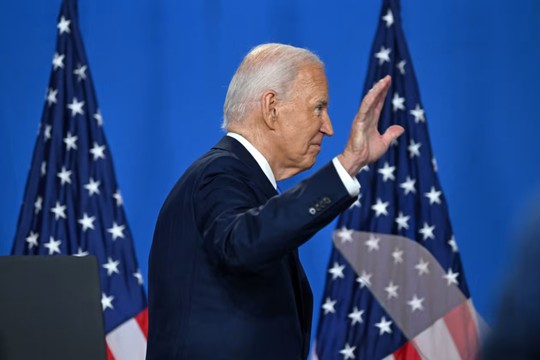Photo: AP
The US President’s announcement on July 21st that he is ‘standing down’ has not come as a surprise, though it is a first in American history because the decision comes only 106 days before the election.
Biden’s legacy includes the Ukraine war which could have easily been prevented, had the US played a mediatory role, and an escalating Near Eastern conflict for which there is no end in sight. While Ukraine is facing utter defeat, the United States and its Western allies are in retreat in West Asia, Africa and even Latin America. Major cracks are tearing the EU and NATO apart, notes Côme Carpentier de Gourdon, the convener of the Editorial Board of the ‘World Affairs Journal’.
At home high inflation, continuing infrastructural decay and industrial decline undermine an American economy worn out by a crushing burden of compounded debt and overwhelmingly dependent on imports from China, even for its defence procurements. As a result, the US Dollar that underpins American dominance is losing a growing share of global trade.
The radical woke agenda promoted by the Biden administration has run into headwinds as more and more people and businesses are rejecting its dogmatic, unrealistic premises and counterproductive recipes.
The systematic policy of arbitrary sanctions against countries that run afoul of American and European views has turned much of the world against the hitherto imperial West and is visibly unsuccessful. Russia for one suffers the consequences of the war in Ukraine but has benefited overall from the poorly thought-out sanctions applied by the thousands on its economy and society while Europe is the big loser.
The military-industrial complex of America makes handsome profits from the Ukraine and Israeli-Palestinian conflicts but its limitations in capacity have created a shortfall in equipment that gravely affects the preparedness of US forces.
All those failures and problems made the Biden administration policies untenable and the return of President Trump perhaps inevitable, given the weakness and divisions in the Democratic Party. In addition, Biden’s mental and physical deterioration (he is suspected of suffering from dementia and the early stage of Parkinson, among other ailments) doomed his attempt to hold on to his chair.
It seems however that the ageing President has used his apparently fading awareness and memory to evade questions about the questionable business dealings of his immediate family with Ukrainian and Chinese companies that retained his son Hunter as a highly paid consultant, demonstrably used to gain access to then Vice-President Joe Biden.
It seems that Democrat leaders and top funders invoked the President’s health woes to force him out, thus sidestepping the rising legal troubles that would have mushroomed into scandals had he been reelected. A death blow was dealt to prospects for a second term when a Senate investigation revealed proof of suspect money transfers from abroad to the Biden family.
Kamala Harris, Biden’s designated successor or any other plausible candidate to be elected at the upcoming Democrat Convention are no match for the GOP ticket that rides the crest of a wave of anti-incumbency fueled by anger about mass illegal immigration and economic malaise. The popular opposition to Washington’s involvement in the Russo-Ukrainian war and to the US military support for the massacres in Gaza plays in Trump’s favour as he promises peace and stability, even if many doubt that he can achieve either. Against him, Kamala Harris has to bear the burden of the failed policies pursued by her predecessor that have alienated the left wing of her party.
On the Centre and among Independents, Robert Kennedy Jr. is likely to snatch quite a few voters.
Only the ‘Never Trump’ lot and dyed-in-the wool feminists are sure to vote for Kamala who has few clear opinions and even less interest in foreign policy. Insiders at the Biden White House easily confess that Kamala Harris is a lightweight who could not find a definite role while she was VP because she could not be trusted to apply herself and deliver results. She was not an asset in policy making or implementation and she is notorious for her rambling and irrelevant remarks when she delivers a speech.
In the face of a mediocre and confused opposition, Trump is expected to decisively win. Indeed he has begun to chart his foreign policy as can be gauged from his initiatives about Ukraine (Prime Minister Orban of Hungary was alleged to be his informal emissary to Kyiv, Moscow and Beijing lately). Trump expects the international situation to change even before he is sworn into office. The increasing likelihood of his victory has already plunged the EU leadership into a crisis and made even Britain worry about its pro-Ukrainian decisions.
Trump is likely to act tough with European statesmen for which he has little consideration. His priority is to take on China in the economic and commercial arena and to be more effective against Beijing, he wants to repair relations with Russia, disengage from the financially and industrially burdensome Agenda 2030 for sustainable development, put NATO on the backburner and remove many of the Democrat’s environmental and labour regulations while reducing foreign debt.
If he wants peace in Ukraine, he will have to make concessions to Russia and force Ukraine to eat humble pie. He will certainly require in exchange some concessions from Putin and they may well concern the ongoing BRICS consolidation system, including the incipient BRICS common currency that Trump wants to nip in the bud.
Trump wants a ‘deal’ with Russia on Ukraine. But it is hard to tell, whether Moscow can accept Trump’s ‘bargain’, given the lack of trust in US promises and the possibility that the Trump administration may fail in its objectives and even break down in the face of entrenched opposition at home (including from many powerful GOP politicians and foreign policy professionals) and predictable domestic unrest, not to mention what may happen in four years.
read more in our Telegram-channel https://t.me/The_International_Affairs

 8:47 27.07.2024 •
8:47 27.07.2024 •























